MaryAnn Bernal's Blog, page 4
March 9, 2021
Book Spotlight and Excerpt: A Sword Among Ravens (The Long-Hair Saga) By Cynthia Ripley Miller
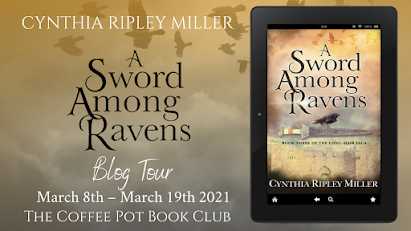
In a grave, on the edge of a Roman battlefield, an ancient sword has been discovered. Legend claims it belonged to King David of Israel and carries a curse—those who wield it will tragically die—but not the chosen.
AD 455. Arria Felix and her husband, Garic the Frank, have safely delivered a sacred relic to Emperor Marcian in Constantinople. But now, Arria and Garic will accept a new mission. The emperor has asked them to carry the sword of King David of Israel to the Church of the Holy Sepulchre in Jerusalem where Arria will dedicate it in her murdered father’s memory.
As Arria and Garic travel into the heart of the Holy Land, they face many challenges and dangers. Their young daughter is missing then found in the company of a strange and suspicious old monk. A brutal killer stalks their path. And a band of cold-blooded thieves is determined to steal the sword for their own gains. But when Arria confronts the question of where the sword should truly rest—old friendships, loyalties, and her duty are put to the test like never before. At every turn, Arria and Garic find themselves caught in a treacherous mission wrapped in mystery, murder, and A Sword Among Ravens.
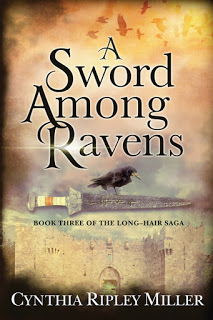
EXCERPT
EASTERN ROMAN EMPIRE: Constantinople—AD 455
The Imperial Palace, The 25th day of Aprilis
Emperor Marcian sighed but continued, his face grim. “It may sound incredulous, but the sword belonged to King David of Israel. My most educated priests and Jewish leaders in Constantinople have validated the weapon’s period, and lineage by its style and the language engraved on its blade. The inscription reads, A curse on the one who wields David’s Sword and not be chosen.”
Marcian stopped and glanced away. His face fought for composure, but after a moment, he returned his attention to them. “These holy men claim the legend behind this ancient weapon is based on an act of betrayal and hypocrisy.” The emperor reached for his goblet and drank the wine down. A servant promptly refilled his cup and came to them. Arria waved him away, but Garic raised his goblet, drank, and in unison, the men rested their cups on the table.
“Are you familiar with the story of David and Bathsheba?” Emperor Marcian asked, placing his hands on his knees.
Arria replied, “I am. King David lusted over the married woman Bathsheba, and he caused her husband’s death. As you know, Garic is a new Christian and unfamiliar with the stories from the bible.”
The emperor’s eyebrow raised. “Ah, yes. A pagan convert. Then your husband may find this story most interesting.” With a pensive tone, he began, “One day, David saw a beautiful woman named Bathsheba bathing, and he was filled with desire for her. But she had a husband, Uriah, a soldier who was away fighting. David summoned Bathsheba to him and seduced her, and she became pregnant. David despaired. To save her from death for adultery, he decided to bring Uriah home to lie with his wife.”
The emperor reached for his cup and drank. Handing it to his servant, he raised a palm but pointed to them. They both shook their heads. As the young man backed away, he continued, “Uriah being a loyal soldier, and true to the code of warriors still fighting, refused to return to the comfort of his wife and stayed with the palace soldiers. This was when David plotted to make Bathsheba a widow. He ordered his general to place Uriah in the front of his army and sent him to battle where he died. Later, David married Uriah’s widow, but Israel’s prophet, Nathan, came and reprimanded him for his deception and murder. Out of guilt for his sin and loss of honor, it’s thought that David had his favorite sword inscribed with this warning and buried, along with Uriah’s body, in a land where it might never be found.” The emperor became quiet. “Those who know the legend of the sword believe this inscription foretells that, if discovered, the sword will choose a mighty and righteous owner. One who is strong and virtuous of heart. Only he can wield it in combat and not be cursed. Anyone else must suffer a tragic or untimely death.”
Emperor Marcian bowed his head and gripped his chair’s gilded armrests. He looked up. His eyes brimmed with conviction, and his voice grew solemn, “I do not know why, but I believe that Lucius fell victim to this curse. Right now, very few know of the sword’s existence, but in time, more men—some who are mercenary—may become aware.”
The emperor raised his hand and commanded all but one slave, a slight man with thin grey hair and round eyes, to leave the room. Then, he ordered the servant, “Erasmus, bring me the artifact.
Erasmus shuffled over to a large wooden trunk set in an alcove, undid the lock, and pulled out a metal box about three feet in length and six inches high. He brought it to the emperor. Emperor Marcian rose from his chair and placed it on a nearby table. Arria and Garic followed and stood over it.
“When Severus brought me the sword, it was in the bronze sheath Lucius had made for it, but my son told me that he found it encased in a silver box, which I think he might have left at your villa in Tuscia.”
Arria frowned. “I have never seen this box,” she replied grimly. Why had Lucius chosen to be secretive? Had he felt he was protecting her? These questions filled and confused her.
The emperor unhooked the latch and lifted the lid. Arria looked inside. She was struck by an odd luminescence that emanated from the weapon, even in the sunlit room. She glanced at Garic, who appeared transfixed. Arria reached out and touched the smooth, cold metal. “How strangely beautiful. The stones in the pommel still shine a brilliant red.”
“Ja.” Garic agreed. He looked at the emperor. “May I hold it?”
Emperor Marcian nodded his consent.
Garic lifted it from the blue linen folds lining the box, drew it from its sheath, and held it vertically tip to the ceiling. Admiration filled his eyes.
“The weapon is priceless,” the emperor said. “King David lived more than a thousand years ago, and from him, Christus was descended. The artistry, silver, and rubies also add to its value.” The emperor shook his head and continued, “I could try and protect it here in Constantinople, but when I look at it, I feel only a bitter hatred. Besides, my holy men believe that if the sword carries a curse, it must be returned to its source and home, to break the spell.”
Garic slipped the sword into its sheath and placed it in the box. He wrapped his arm around Arria’s shoulder. She knew Garic understood the emperor was about to reveal the destination of this mission.
Buy Links:
Amazon UK • Amazon US • Amazon CA • Amazon AU • Barnes and Noble • Kobo
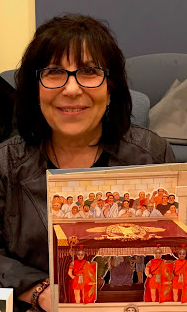
Cynthia Ripley Miller
Cynthia Ripley Miller is a first generation Italian-American writer with a love for history, languages, and books. She has lived in Europe and traveled world-wide, holds two degrees, and taught history and English. Her short fiction has appeared in the anthology Summer Tapestry, at Orchard Press Mysteries.com, and The Scriptor. She is a Chanticleer International Chatelaine Award finalist with awards from Circle of Books-Rings of Honor and The Coffee Pot Book Club. She has reviewed for UNRV Roman History, and blogs at Historical Happenings and Oddities: A Distant Focus and on her website, www.cynthiaripleymiller.com
Cynthia is the author of On the Edge of Sunrise, The Quest for the Crown of Thorns, and A Sword Among Ravens, books 1-3 in her Long-Hair Saga series set in Late Ancient Rome, France, and Jerusalem. Cynthia lives outside of Chicago with her family, along with a cute but bossy cat.
Social Media Links
Website • Facebook • Twitter • Pinterest• Amazon• Goodreads
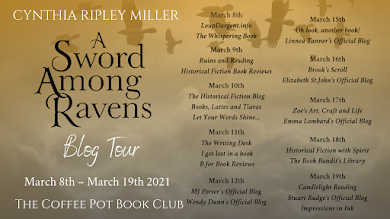
March 1, 2021
Book Spotlight and Excerpt: Beware the Lizard Lurking (The House of the Red Duke, Book 2) by Vivienne Brereton
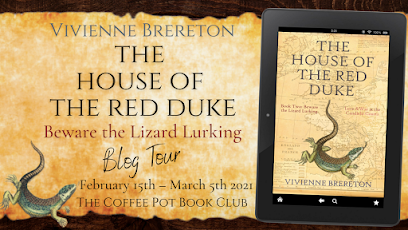
Welcome to the candlelit courts of Europe!
Uninvited guests at a secret wedding.
A frozen River Thames.
May Day celebrations to remember.
The young Henry VIII, with the aid of his chief advisor, Thomas Wolsey, and against the counsel of Thomas Howard, the Earl of Surrey, is hellbent on a so-called holy war with France. This puts him at odds with his Scottish brother-in-law, James IV of Scotland, and his older sister, Margaret.
Both Tristan and Nicolas know that time is running out for them before they have to…enter the Church - and into an arranged marriage, respectively. In the meantime, they remain at loggerheads over pretty Ysabeau de Sapincourt, the spoilt young wife of the hapless Robert.
At La Colombe, near Ardres, in Picardy, spirited little Valentine is still making mischief as she sees fit.
Across the Narrow Sea, Cecily is perfectly content in her beloved Zennor Castle, in Cornwall.
None of them know what Dame Fortune has in store for them. Will she allow them to follow their own paths…or has she got other ideas?
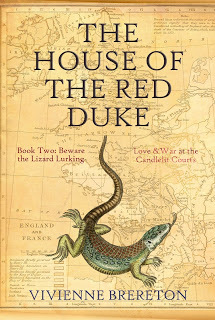
EXCERPT
The following passage is the first time Valentine de Fleury appears in Beware the Lizard Lurking, up to mischief as usual. The eldest daughter (with four sisters) of Charles, a baron, nine-year-old Valentine is aware that her father is in desperate need of a male heir. If not, the entire family estate will pass to a distant male cousin. Close neighbours of the Ardres family at the nearby Castle, Valentine enjoys nothing more than bating Tristan, the younger son who is destined for a cloistered life in the Church.
Saint Valentine’s Day, 1513.
La Colombe. Picardy, France.
Valentine was bored. She’d sought out Béatrice but now she was being shooed into the garden, and told to go and find Bonne and her little sisters.
‘I need to go the kitchens and ask Maître Jacques for some soft-boiled eggs for your mother,’ said the housekeeper. ‘Her food was too salty yesterday. Everyone knows that an excess of salt in a woman’s diet results in a babe born without nails.’ She gave Valentine a gentle push. ‘Vas-y,ma petite. And don’t take your mittens off. You’ll catch a rheum.’
Valentine shuddered at the thought of this latest little baby brother being born without nails. Poor Maman. Preparing for a babe seemed very tiresome, especially as you spent your days sore ailing. And all that for a babe who was born sickly and ended up in the churchyard of Notre-Dame de Grâce. <<I’m quite sure I never want to be with child>>
Wandering down to the herb garden, from the steps above, Valentine could see two of her sisters but they were with Barbe, the pastry cook’s young daughter, not Bonne. Knowing there would be little likelihood of Barbe wondering where she was, Valentine decided to seize the opportunity to go off on an adventure.
<<I’ll go to the Castle to see what Tristan’s up to. It’ll vex him and give me some sport. Everyone here’s been far too busy to remember it’s Saint Valentine’s Day, as well as my name day>>
Even though it was still early in the morning, Valentine had convinced herself there’d be no gifts for anyone this year. She was quite certain she’d have more luck chasing a moonbeam in May than waiting around at La Colombe. All of a sudden, she brightened at the thought of going over to the Castle. <<Who knows, they might be giving each other gifts and I might get some marchpane from their cook>>
*
Deciding to take a short cut, she hurried across several frost-gilded fields, and up a very long winding path to reach the Castle. She could feel her spirits lifting the moment she set eyes upon Tristan’s magnificent family home, nestled comfortably on a hill high above the banks of a lake. She and her father often passed it on one of their many walks so she knew that it was several hundred years old, and each successive member of the Ardres family had inherited it from his own father.
<<Unlike our home. And poor Papa who might have to suffer a distant cousin coming to live at La Colombe, just because all of his children are girls>>
Although this thought made her chest feel very tight, Valentine allowed the scene before her to soothe away such unwelcome thoughts. She turned to look back down at the lake. Pretty blue turrets, sunlight playing on the walls, various trees and, in particular, a nearby overhanging weeping willow, were all reflected quite spectacularly in the water lapping against the sides.
She knew all about the Castle’s history from her father who delighted in teaching her facts from far-off times. Tristan’s family home dated back five hundred years: to when the first Comte d’Ardres, commanded by Duke William of Normandy to visit the Abbot of Saint Michael’s Mount in Cornwall, England, with the Abbot of the Mont Saint-Michel (who lived near the original family seat, not far from Saint-Malo) had taken a fancy to the green, fertile countryside, and decided to build his principal dwelling there. Ever since that time, the black and golden eagle of the Ardres coat-of-arms - with its outstretched wings signifying protection - had been proudly displayed above the entrance to the Castle.
“And,” her father had told her, “every single lord and master who’s ever lived there has tried his best to live up to the family motto: ‘Verum animi et robore mentis’.”
*
Skipping across the drawbridge as she’d done so many times before, Valentine walked under the arch, past the heavy studded gates and entered the large courtyard. Half-expecting to find Tristan there, she was slightly crestfallen when she came across his brother, Gilles, and the Count’s ward, Nicolas, engaged in a noisy sword fight. Nicolas was obviously much more accomplished than the Ardres heir (a worthy claimant to the family fortune, like the one her father was longing to appear at La Colombe), and as light on his feet as one of the acrobats who’d performed at her home on Twelfth Night.
Both young men were comely but Nicolas was by far the more eye-catching, she decided. With his dark eyes, curls as black as a pail of tar, and a well-shaped mouth, now pressed tight in concentration, she could see why all the maids at La Colombe admired him. They were both so engrossed in their game that she stood there for several long minutes before they noticed her. Holding up his sword straight in front of him to signal to Gilles that he was taking a break, Nicolas gave her a sweeping bow.
‘Bonjour, ma petite Valentine. Have you come to watch two knights in training?’
‘Ou—’
‘Non!’ interrupted Gilles, mopping his brow with a large white handkerchief. ‘She’s come to smile prettily at our cook, knowing he can’t resist her charms. He’ll probably make her some tasty titbit, such as a necklace of dried fruit and almonds that’s been caramelized using the heat of the fire. C’est vrai, n’est-ce pas, Valentine?’
Nicolas smiled at her. ‘And why shouldn’t the cook give her something? As it’s your name day today, it’s only fitting that you should have a gift.’
‘Merci, Nicolas!’ exclaimed Valentine, jumping up and down in the air, clapping her hands together. ‘Everyone at La Colombe is far too triste to bother with any of that.’
‘Then we must make amends right away,’ he replied. ‘Come, let’s go to the kitchens.’
‘What about your fight?’
‘Oh, don’t trouble yourself about that,’ said Gilles, looking quite relieved, she thought. ‘Nicò has got the better of me as usual.’
Valentine watched Nicolas reach out and slap Gilles on the shoulders. ‘Bravissimo, mio amico! We’ll make a swordsman out of you yet.’
Buy Links
Amazon UK • Amazon US • Amazon AU
¸.•*´¨)✯ ¸.•*¨) ✮ ( ¸.•´✶

Vivienne Brereton
Born between historic Winchester and Southampton in the UK, Vivienne has been passionate about the Tudors for as long as she can remember. This led to a degree in Medieval History at university, and the growing desire to write a novel.
However, life took over somewhat and only after stays, short and long, in six countries she called home did she finally settle down to finish her novel.
Words have always played an important part in her life, whether it's been writing, editing, teaching English, or just picking up a good book.
Having three sons came in very handy when she had to write about squabbles between the male characters in her novel. Not so handy when she took her boys to Hampton Court and one of them got lost in the maze!
Seeing 'A Phoenix Rising', the first book in the series 'The House of the Red Duke' in print for the first time was a moment of great joy for her. She very much hopes that anyone reading ‘Beware the Lizard Lurking’, the second book in the series, will enjoy the end result as much as she enjoyed writing it.
Connect with Vivienne
Website • Twitter • Instagram • Facebook
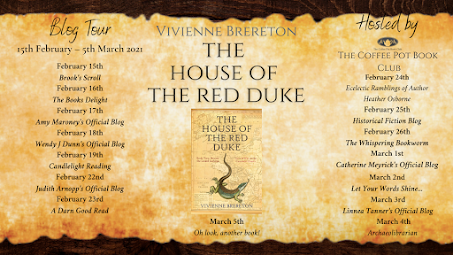
February 23, 2021
The Coffee Pot Book Club: #BookReview — Forgiving Nero by Mary Ann Bernal

Rome. The jewel of the civilized world is no longer what it was. Strength has failed the Senate. Her legions are in disarray, and the Empire has fallen into Lucius Domitius Ahenobarbus Nero’s hands. His reign begins under a cloud of scrutiny, for he is the depraved Emperor Caligula’s nephew. Nero is determined to overcome that stigma and carve a name of his own. One worthy of Rome’s illustrious history. Politics and treachery threaten to end Nero’s reign before it begins, forcing him to turn to unexpected sources for friendship and help. Many of the Praetorian Guard have watched over Nero since he was a small child, and it is in Traian that the young Emperor places his trust, despite the inherent threat of reducing his mother’s influence. Traian is the father he never had and the one man who does not judge him. When Traian secretly marries the hostage Vena, it sets in motion a collision of values as Traian comes to odds with his former charge. The whirlwind that follows will shake the very foundations of the greatest Empire the world has ever known, and survival is far from guaranteed.

I am Nero. And I am your Emperor.
Ruthless, ambitious, and determined to secure her position, Agrippina saw an opportunity and took it. Her son, Lucius, would become Emperor, and she cared not who she had to step over or kill to achieve that aim. Once her son had been named Emperor, Agrippina was determined to use his youth to her advantage, and rule through him. But she failed to see the danger of what she had created.
Traian Aelius Protacius had been assigned to protect Lucius when he had been a young, frightened boy in exile in Calabria. Lucius had been a compassionate child, a little boy desperate for love. But now, as a man, he was unrecognisable. His reign had started with such promise, but there was nothing of the boy in the Emperor who stood before him now. Traian would remain loyal to Nero—as he now liked to be called. He would be the one constant. He could not abandon him, no matter what he did, and yet nor could he save him. Instead, all he could do was watch while Nero rapidly turned away from his trusted advisors and instead listened to those who fed his ego, who bowed to his every whim, and who treated him like a god.
Deep down Nero knew that his hold on the throne would always be precarious. For in truth, the throne, like the laurel upon his head, was never meant to be his...
From a fearful young boy’s first night in the Imperial Palace to his descent into madness, Forgiving Nero by Mary Ann Bernal is the unforgettable story of one of the Roman Empire’s most notorious Emperors.
Nero is one of the infamous emperors whose history has been dictated by those who wanted to see his downfall. History, after all, is not written by the loser. Bernal does not pretend that Nero was a beloved emperor, but nor does she make him quite as monstrous as we have all been led to believe. He is a competent administrator; he takes advice from learned men such as Seneca, and although he is also greatly influenced by his mother in this story, Nero is compassionate when compassion allows. History has often accused Nero of causing the Great Fire of Rome so that he could build his ‘golden house’, but Bernal argues quite rightly that this was not the case at all, and in fact, he helped those who had lost their homes—it just so happened that the fire meant he could build his palace, which in turn meant he needed money and was not afraid to demand it! Bernal has also given us a Nero who is not opposed to murder, nor is he opposed to persecution. Someone had to take the blame for the Great Fire, and the Christians just so happened to be in the wrong place at the wrong time.
I thought Bernal’s depiction of Nero’s mental health, especially his guilt at some of the things he had done, demonstrated her understanding of human fragility and how easy it is to travel down a path of self-destruction. His childlike behaviour in Greece, his instance on winning the laurels at the Olympic Games, caused his sanity and, therefore, his rule to be questioned. He acted like a spoilt child, and he was, consequently, seen as such. But underneath it all, Bernal hints there is still a frightened little boy who just wants to be held by his mother and told that everything would be alright. Bernal has taken the historical sources and picked through the myths and the lies, and has given her readers a more rounded view of Nero and his time as emperor.
The antagonist in this novel is surprisingly not Nero but his mother. Agrippina was a survivor. She had been abused but had somehow managed to turn the tables and come out on top. She used her beauty, intelligence and her ruthless ambition to achieve her aim. I thought Agrippina’s depiction was fabulously portrayed. She is this powerful woman, who not only influenced her son but allowed him to be convinced that he was divine. Unfortunately, Agrippina made the terrible mistake of thinking she could control this monstrous man she had shaped and created. Agrippina was a character that initially I felt sorry for because of the abuse she had endured, and perhaps, to some extent, that abuse explained some of her behaviour - she wants to be in a position of power so that such a thing can never happen again. However, her lack of empathy, the lies, the manipulation of information, and how she makes her son dependent on her made for some disturbing reading. The abused becomes the abuser, and Bernal asks her readers if Nero ever stood a chance to become the man he wanted to become. And in fact, there are several moments in this novel where Nero realises that the boy he was, Lucius, has been devoured by this monstrous Nero that his mother had fashioned in her image.
Honour and loyalty is a theme that runs throughout this novel. Nero’s benevolent nature and youthful desire to change the world came through on the odd occasion, such as when he helps those in need after the Great Fire. On such occasions, he behaves honourably. But there are moments when his extravagance and debauchery and his belief that he rules by Divine right means he loses track of what is honourable and what is not. He becomes confused, baffled even, as to what he is meant to be doing. He believes that he rules supreme and everyone should bow down to him. He demands loyalty, which history teaches us and Bernal shows us, never ends well.
Unlike Nero, who struggles throughout this book with what is right and what is wrong, Traian does his very best to be an honourable person, and although at times he is disloyal, not to Nero, never to him, but to another that he loves, he takes that act of disloyalty and does his best to learn from it, which I think demonstrated how vastly different Traian was to Nero. Acte, much like Traian, remains loyal to the memory of Lucius the boy and that memory she would never betray. Nero is surrounded by good people in this novel, but he is influenced by the wicked because those who wish him well, who want to help guide him to follow the right path, fear that if they upset him or his mother, they could forfeit their lives.
Religion and religious persecution are also explored in this story. Initially, the Christians are tolerated, to an extent. Through characters such as Vena, Bernal examines the dangers of practising a faith that differed so very much from Roman theology. Paul of Tarsus makes several cameo appearances in this novel, and his beliefs put him at odds with the Empire. The slaughter of the Christians after the Great Fire was incredibly harrowing, but masterfully drawn.
This story demanded all of my attention from beginning to end. The narrative was utterly enthralling, and Bernal told Nero’s story with a keen understanding of what makes history worth reading. Bernal has brought Nero back to life, and she has explored that life with a profound sweep and brilliance.
Bernal writes with such elegance and authority, not to mention with a keen attention to the historical detail, that a reader can comfortably immerse themselves in this story. Forgiving Nero by Mary Ann Bernal is a must-read for anyone who enjoys quality Historical Fiction.
I Highly Recommend.Review by Mary Anne Yarde.
The Coffee Pot Book Club

Amazon UK • Amazon US

 Mary Ann Bernal attended Mercy College, Dobbs Ferry, NY, where she received a degree in Business Administration. Her literary aspirations were ultimately realized when the first book of The Briton and the Dane novels was published in 2009. In addition to writing historical fiction, Mary Ann has also authored a collection of contemporary short stories in the Scribbler Tales series and a science fiction novel entitled Planetary Wars: Rise of an Empire. Originally hailing from New York, Mary Ann now resides in Elkhorn, Nebraska.Connect with Mary Ann:
Mary Ann Bernal attended Mercy College, Dobbs Ferry, NY, where she received a degree in Business Administration. Her literary aspirations were ultimately realized when the first book of The Briton and the Dane novels was published in 2009. In addition to writing historical fiction, Mary Ann has also authored a collection of contemporary short stories in the Scribbler Tales series and a science fiction novel entitled Planetary Wars: Rise of an Empire. Originally hailing from New York, Mary Ann now resides in Elkhorn, Nebraska.Connect with Mary Ann: Website • Whispering Legends Press • Twitter.
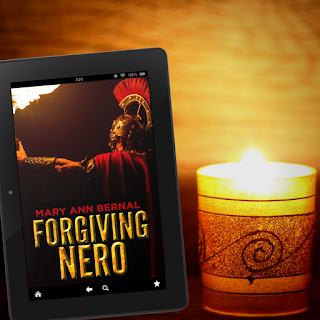
February 22, 2021
An interview with M. Lynes, author of Blood Libel
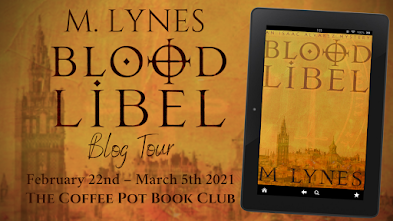
Seville, 1495
The mutilated body of a child is discovered behind a disused synagogue. The brutal Spanish Inquisition accuses the Jewish community of ritual child murder - the ‘blood libel’. The Inquisition will not rest until all heretics are punished.
Isaac Alvarez, a lawyer working for the royal estate, is a reluctant convert to Catholicism who continues to secretly practice Judaism. When his childhood friend is accused of the murder Isaac is torn between saving him and protecting his family. Isaac is convinced that solving the murder will disprove the blood libel, save his family, and protect his faith.
As the Inquisition closes in, how far will Isaac go to protect both his family and his faith?
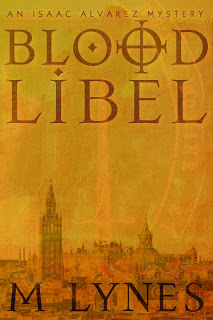
¸.•*´¨)✯ ¸.•*¨) ✮ ( ¸.•´✶
Michael LynesAuthor Interview
Please tell us a little about yourself.
I started out as an English teacher. I had a long career in global education during which I wrote and edited professionally. I’m originally from London, England but now live with my family in Dubai.
When did you start writing?
I’ve always written. When I was at primary school my ambition was to be a journalist but when that didn’t work out, I went into teaching English as both a first and second language. But I always enjoyed teaching Literature the most. I’m not a writer who feels the need to write every day, neither do I keep a journal, but I’m usually thinking about writing something.
What projects have been published?
My debut novel Blood Libel was published in January this year. It won a prize at the Emirates Literature Festival in 2020 and I launched it at the February 2021 event. It’s the first of the Isaac Alvarez mysteries. I’ve also published The Lost Book of Hours, a short story that shows Isaac undertaking his very first investigation – at home. It’s available for free when you sign up to my newsletter at www.michaellynes.com.
Tell us about Blood Libel
Blood Libel is set in Seville in 1495 at the height of the Spanish Inquisition. A child is brutally murdered and the Jewish community is accused by the Inquisition of ritual killings – the ‘blood libel’. Isaac Alvarez, a lawyer with the royal estate, is commissioned by King Ferdinand to find the identity of the real killer. Isaac is a reluctant convert from Judaism to Catholicism – a ‘converso’. He is determined to find the killer to defend his faith and protect his family before the Inquisition discovers his secret.
The novel is a mystery but at the heart of it is a family drama. We see at close quarters how the Inquisition sets families and neighbours against each other. We discover how the terror affects individuals and tears families apart. I was a little concerned that the violence would be off-putting to some readers, but early reviews have put my mind to rest. One reviewer said, “I was afraid that the horrors of the Inquisition would overwhelm me but the story centered more on how ordinary people suffered through the uncertainty of the times.”
How did you select the title of your novel?
The title comes from the anti-Semitic slur of the blood libel. One of the first cases of this was Simon, who was two years old when he was found dead in a cellar in the Italian city of Trentino at Easter 1475. The Jewish community was immediately accused of murder and of using the blood of children for ritual purposes - a blood libel. Fifteen Jews confessed, under torture, to the murder and were executed. The Catholic Church subsequently venerated Simon as a martyr.
What was your inspiration?
I learnt about the story of Simon of Trentino whilst spending time with Moisés Hassan-Ansélem in Seville. He is knowledgeable and passionate about the little-known Jewish history of Seville. I was fortunate that Moises read the book and offered invaluable advice. I wanted to explore the parallels with our contemporary concerns about how we can accurately discern truth from fact. How do we know what is true in the age of ‘fake news’? Although the medium has changed, it's astonishing how little human behaviour has.
What are you currently working on?
I’m currently working on Books 2 and 3 of the series. They will be linked and move on to explore how the Muslim community, the Mudejars, were treated during this time. Isaac will travel to Granada and Northern Africa as members of his family are placed in great jeopardy. I’m hoping to publish Book 2 later in 2021 and Book 3 in early 2022.
What are you reading at the moment?
I’m binge reading Louise Penny’s Inspector Gamache series which, if you haven’t read it, I’d strongly advise giving a go. It’s a little quirky but if you read Donna Leon or Andrea Camilleri you will probably like it. For research, I’m reading Blood and Faith by Matthew Carr which is a very readable, comprehensive account of Muslim Spain from 1492-1614. I’m also just about to start Medieval Bodies by Jack Hartnell which has some fabulous, and occasionally gruesome, pictures.
What do you like to do in your free time when you're not reading or writing?
At the moment all my free time seems to be spent on aspects of publishing and marketing books! But I love playing football and building huge Lego sets with my twelve-year-old son Danyal, going for long walks and occasional runs.
Do you have any advice for other authors?
There’s so much advice out there but I think two simple things are important: read as widely as you can and find out what works for you in the writing process. The other thing I’ve found invaluable is taking the courage to share my work with other writers on a regular basis.
And finally, can you tell us some fun facts about yourself, such as crossed skydiving off my bucket list.
I’m not sure it counts as fun, but I completed the London Marathon five years ago.
Buy Links

M Lynes
Michael is an author of historical mysteries who writes under the pen name of M Lynes. He has a particular interest in early 16th century Andalucia. He is fascinated by the interplay between cultures, globalization and religious intolerance of that period in Spain’s history. The ‘Isaac Alvarez Mysteries’ are set against this rich background. He won a prize for his fiction at the 2020 Emirates Literature Festival and is an alumna of the Faber Academy’s Writing a Novel course.
His debut novel ‘Blood Libel’, the first full-length Isaac Alvarez Mystery, was published in January 2021. Isaac, a lawyer working for the royal estate, must solve a brutal child murder to protect his family and his faith from the Spanish Inquisition.
Michael is hard at work on the second novel in the series and planning the third. He is originally from London but currently lives in Dubai with his family.
Connect with Michael
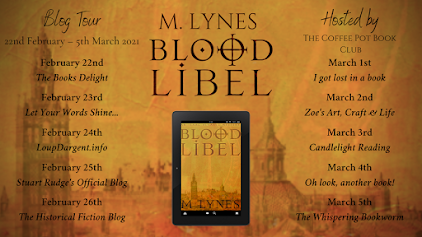
February 17, 2021
Spotlight on Mal Foster, author of Jude & Bliss
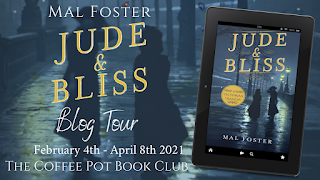
In the Victorian era, for many young women, going into domestic service was a significant source of employment where they found suitable work but with extended hours for a reasonable salary, receiving free accommodation as well as enjoying the perks and prestige of working for the aristocracy or other members of the upper or middle-classes.
As a matter of course, employers had a moral obligation, but one without a legal requirement to ensure their servants were kept clean, healthy, and well-nourished. However, for one poor girl, that, unfortunately, was not the case.
In 1896, Jude Rogers, a wide-eyed but vulnerable sixteen-year-old from Woking, Surrey, secures a position as a domestic servant at a large terraced house in Half Moon Street, near London's Piccadilly. Following a brief settling-in period, she quickly realises everything is not quite as it seems.
As time moves ruthlessly forward, what happens next is almost beyond comprehension. Jude finds herself in the most impossible of situations and finally succumbs to the pure evil dealt out by her employer.
This story is NOT for the faint-hearted!
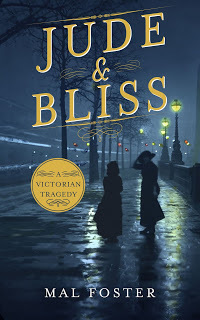
¸.•*´¨)✯ ¸.•*¨) ✮ ( ¸.•´✶
Mal Foster
Fun Facts
I used to belong to an amateur musical society in Camberley, Surrey, called CAMUS. In 1983 I was invited to play the part of Lt Joseph Cable in their stage version of Rodgers and Hammerstein’s ‘South Pacific’, singing solo for the first time ever. ‘South Pacific’ was one of my late mother’s favourite films, so I gave her two tickets for the show, but didn’t tell her I was appearing. The look on her face when she saw me walk on stage was something else, and to this day, I still don’t know whether it was one of shock, horror, of just plain pride in her son who had obviously duped her.
Gozo, Malta, I regard as my second home. My third novel, ‘An Invisible Nemesis, published in 2019, is predominately set on the islands. I made my first visit to Malta alone in October 1988. The second day I was there, I was walking down a street in the capital, Valletta when I heard a voice, I recognised behind me. It was Mr Wilkinson (or Rodney), a teacher I hadn’t seen since leaving school some fifteen years previously. He somehow recognised and remembered me and with his wife, we spent the rest of the week sharing stories, ‘what might have beens’ and drinks together. He said, “one day I might make it as a writer!”
In 1984 I joined the railways fulfilling a series of roles before taking early retirement in 2014 after 30 years. In November 1998, as a station manager, I was on Royal Train duties. It was my task to escort HRH Prince Charles on to the train at Hampton Court railway station. It had passed midnight and a little worse for wear, he had been celebrating his fiftieth birthday at Hampton Court Palace. The train had been prepared for a trip to Sheffield where the prince had an engagement the following day. The media were at the station in numbers, expecting the prince to be with Camilla, it was just after he had started seeing her in the aftermath of the death of Diana, Princess of Wales, just over a year before. Camilla wasn’t there, and the only thing the press photographers got, was an image of HRH Prince Charles and me walking along the station platform. It was quite amusing seeing myself labelled as his Royal Equerry in some of the national newspapers a couple of days later.
It’s no secret that I had left school at just fifteen-years-old before taking any formal qualifications. My ambition was always to be a journalist but without the necessary qualifications that was never to be. Well, not until I had reached my late fifties anyway. In 2015 I was attending a local football match near where I live when I struck up a conversation with the new editor of the Woking News & Mail. She had seen some of my work on the local community website and was impressed with my style of writing. Within a week I joined the paper on a freelance basis. So, never, say never!
I have a bit of a reputation for going to the pub. I’ve also been married three times, and by pure coincidence, I met all three of the ex-wives in pubs. (Two of them were barmaids). Towards the end of each marriage, all of them said, ‘Mal, you can never stay out of the pub.’ One good thing to come out of the recent Covid-19 restrictions is that I’ve been able to prove all of them wrong!
Buy Links
Amazon UK • Amazon US • Book Depository
¸.•*´¨)✯ ¸.•*¨) ✮ ( ¸.•´✶
About the Author

Mal Foster
Mal Foster was born in 1956 in Farnham, Surrey, and grew up in nearby Camberley. He was educated at secondary modern level but left school at just fifteen years old to help support his single mother and younger brother. It was around this time that he began writing, and indeed, his first poems were published soon after.
In 2007 his most widely read poem The Wedding was published in the Australian Secondary Schools anthology Poetry Unlocked' a book that formed part of its English Literature exam curriculum. The irony of its inclusion has always amused Mal considering he left school before gaining any formal qualifications himself.
A former local journalist, his first novel The Asylum Soul, a historical tale of incarceration was published in 2015. A second book, Fly Back and Purify, a paranormal drama appeared in 2017. Described as an explosive conspiracy thriller, An Invisible Nemesis was published at the beginning of May 2019.
In November 2020, his fourth novel, Jude & Bliss, was published and marked a return to historical fiction for Mal. "This book is close to my heart, it's the one, I think, which will define the course of my future writing," he told one observer.
Connect with Mal
Website• Twitter • Instagram • Facebook
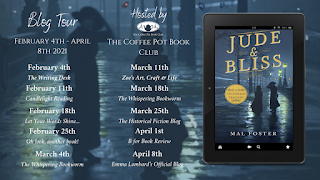
February 15, 2021
Book Spotlight and Excerpt: The North Finchley Writers’ Group by Richard Tearle, with Helen Hollick
 When a group of north London writers meet each month for a chat, coffee, and cake – what else is on their agenda? Constructive criticism? New Ideas? An exciting project? And maybe, more than one prospective romance...?
When a group of north London writers meet each month for a chat, coffee, and cake – what else is on their agenda? Constructive criticism? New Ideas? An exciting project? And maybe, more than one prospective romance...?Eavesdrop on the monthly meetings of the North Finchley Writers' Group, follow some ordinary people with a love of story writing, and an eagerness for success. Discover, along with them, the mysteries of creating characters and plot, of what inspires ideas, and how real life can, occasionally, divert the dream...

EXCERPT
LET ME INTRODUCE MYSELF
My name – my personal and professional name – is Rob Taylor and I'm a writer.
It is rather strange to state that as a fact after years of scribbling, despair at rejections tempered by moments of high elation when one of my stories was accepted by a respected magazine. But I can state it as a truth now, for I write regularly for several publications, and my first compilation has recently been published with a fixed contract for two more to follow. At the moment, I write short stories, but more than a few friends have encouraged me with prompts such as “You have a novel in you, you know,” and, “A short story has the potential to be a novel writ long.” I am working on the idea.
But enough of that.
About a year or so ago, I was unexpectedly made redundant. Jobless, but with a good-enough redundancy bank balance to keep me going for a bit, and a determination to do what I wanted to do – write – I took the plunge and converted the spare bedroom into a study. I started writing full time and joined the North Finchley Writers' Group, where I met some lovely people who, one way or another, gave me the encouragement to develop my ideas.
All to my satisfaction, but my wife's dismay.
The members of our writers’ group are a very mixed bunch, as you will find out. We meet every month at a different house and whoever is the host gets to provide tea and coffee – often with cake or ‘light snacks’ – and chooses a topic for discussion. We talk, voice opinions, and yes, sometimes we argue. But it is all forgotten when we walk away into the night.
Mostly.
They've had quite a turnover of members over the years. Some who came for a couple of meetings and then disappear. Some who weren't really writers but 'dabble' and think that attending a writers' group meeting makes them one. They never last long. Some have moved along and, sadly, one or two have passed on to the great Library in the Sky. Nowadays we have about a dozen or so regulars. There are one or two who are deliberately obstructive. Outspoken. Single-minded. Cantankerous.
Some are shy and introverted and, in truth, offer little. But they listen and learn, and that is what we are all there for. To learn from others, be they best sellers or unpublished writers. Because, whatever our differences, we stick together and, if anyone is down, we stand by them and offer encouragement. If someone is on a high, then we enthuse in their success.
Most of us, anyway.
We do have a few Best Sellers. Angela Knight, for example, and Zak Nichols. Charlotte Caroll is more than adept at Regency romances, (not my bag, but, well, credit where credit's due) and Jean Hart uses her history degree to good effect, as does Hilary Jackson, albeit covering a different period of time.
I'll introduce them all properly as we go along...
Buy Link
¸.•*´¨)✯ ¸.•*¨) ✮ ( ¸.•´✶

Richard Tearle
A Word From Richard Tearle :
“To the writing community, whether they be traditionally published, indie or aspiring.
You make the rocking world go round...Writers are such a wonderful community – supportive, helpful and ever willing to give their time and expertise to one humble chap such as I. Thank you all from the bottom of my heart. Thank you. Thank you. Thank you.”
Richard – December 2020
Connect with Richard

Helen Hollick
A Word From Helen Hollick:
It was with great enthusiasm that I encouraged Richard to write this, his first novel. His enjoyment of creating a good story, I felt, should be shared to readers and writers, everywhere. Unfortunately, at the editing stage, Richard became ill, involving hospitalisation. In discussion with his son, rather than abandon the project or put it on hold, we decided that the best course of action was for me to continue with getting this book published on his behalf. The characters, plot – the story – are all Richard’s immense talent, I merely tidied up and added the final polish, coming in as ‘painter and decorator’ to Richard’s main role as architect, designer, and builder.
Connect with Helen

February 13, 2021
NEW RELEASE: Forgiving Nero by Mary Ann Bernal
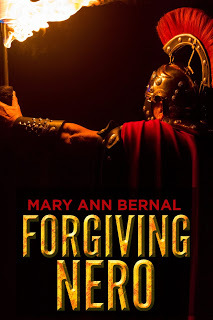
Rome. The jewel of the civilized world is no longer what it was. Strength has failed the Senate. Her legions are in disarray, and the Empire has fallen into Lucius Domitius Ahenobarbus Nero’s hands. His reign begins under a cloud of scrutiny, for he is the depraved Emperor Caligula’s nephew. Nero is determined to overcome that stigma and carve a name of his own. One worthy of Rome’s illustrious history.
Politics and treachery threaten to end Nero’s reign before it begins, forcing him to turn to unexpected sources for friendship and help. Many of the Praetorian Guard have watched over Nero since he was a small child, and it is in Traian that the young Emperor places his trust, despite the inherent threat of reducing his mother’s influence. Traian is the father he never had and the one man who does not judge him.
When Traian secretly marries the hostage Vena, it sets in motion a collision of values as Traian comes to odds with his former charge. The whirlwind that follows will shake the very foundations of the greatest Empire the world has ever known, and survival is far from guaranteed.
Purchase
¸.•*´¨)✯ ¸.•*¨) ✮ ( ¸.•´✶
About the Author
 Mary Ann Bernal
Mary Ann BernalMary Ann Bernal attended Mercy College, Dobbs Ferry, NY, where she received a degree in Business Administration. Her literary aspirations were ultimately realized when the first book of The Briton and the Dane novels was published in 2009. In addition to writing historical fiction, Mary Ann has also authored a collection of contemporary short stories in the Scribbler Tales series and a science fiction/fantasy novel entitled Planetary Wars Rise of an Empire. Her recent work includes Crusader’s Path, a redemption story set against the backdrop of the First Crusade, and Forgiving Nero, a novel of Ancient Rome.
Since Operation Desert Storm, Mary Ann has been a passionate supporter of the United States military, having been involved with letter-writing campaigns and other support programs. She appeared on The Morning Blend television show hosted by KMTV, the CBS television affiliate in Omaha, and was interviewed by the Omaha World-Herald for her volunteer work. She has been a featured author on various reader blogs and promotional sites.
Mary Ann currently resides in Elkhorn, Nebraska.
Connect with Mary Ann:
Webpage Publisher Facebook Twitter Blog Pinterest Instagram YouTube
*
Author Portrait by Doctor Ivan Graphix @DocIvanSFN
February 7, 2021
Book Spotlight: The Fall of Kings (Legend of the Cid, Book 3) by Stuart Rudge

Castile. 1071AD. Three kings. One crown.
After Sancho II of Castile dispatches his champion Rodrigo Diaz de Vivar to capture his brother, King Garcia of Galicia, he hopes it is a defining moment in his quest to reunite the lands of his father under one banner. But Alfonso VI of Leon is one step ahead, and has already added the lands of Galicia to his domain. When the only alternative is war, Sancho turns to Rodrigo to lead the armies of Castile, and he must use all his tactical acumen to defeat the Leonese in the field. Only one son of Fernando can claim victory and become the Emperor of Hispania.
Rodrigo and Antonio Perez, now a knight of the realm, find difficulty adjusting to the new regime. Dissent and unrest run rife throughout the kingdom, and the fear of a knife in the dark from enemies old and new hangs heavy upon the pair. But if it is allowed to fester, it threatens to undo all that has been achieved. Can Rodrigo and Antonio root out the enemies of the king, and prevent chaos reigning throughout the land?
The Fall of Kings in the breathtaking third instalment of the Legend of the Cid.
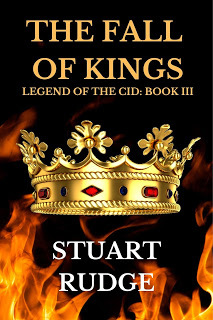
Buy Links
Amazon UK • Amazon US • Amazon CA • Amazon AU

Stuart Rudge
Stuart Rudge was born and raised in Middlesbrough, where he still lives. His love of history came from his father and uncle, both avid readers of history, and his love of tabletop wargaming and strategy video games. He studied Ancient History and Archaeology at Newcastle University and has spent his fair share of time in muddy trenches, digging up treasure at Bamburgh Castle.
He was worked in the retail sector and volunteered in museums, before working in York Minster, which he considered the perfect office. His love of writing blossomed within the historic walls, and he knew there were stories within which had to be told. Despite a move in to the shipping and logistics sector (a far cry to what he hoped to ever do), his love of writing has only grown stronger.
Rise of a Champion is the first piece of work he has dared to share with the world. Before that came a novel about the Roman Republic and a Viking-themed fantasy series (which will likely never see the light of day, but served as good practise). He hopes to establish himself as a household name in the mound of Bernard Cornwell, Giles Kristian, Ben Kane and Matthew Harffy, amongst a host of his favourite writers.
Connect with Stuart

February 1, 2021
Spotlight on Michael L. Ross, author of The Search (Across the Great Divide, Book II)

Where do you go when home is no longer an option?
The guns of the Civil War have ceased firing, and the shots are but an echo... yet the war rages on, deep inside Will Crump's soul. His "soldier's heart" is searching for peace, and in that quest Will joins the westward movement, setting his path on a collision course with adventure, loss, and love.
The Westward Expansion floods the sacred, untouched lands with immigrants, bringing conflict to the Shoshone, Sioux, Cheyenne, and Arapaho. Amidst the chaos Will finds safety in the shadow of the US Army, but the army brings battle-hardened troops into Red Cloud's War, pulling Will into a tornado of conflict. Broken treaties and promises leave both sides searching for answers. Will's search leads him to a battle for survival, and there he finds a love that could change him forever.
Dove, a young Shoshone woman, is a survivor of the Bear Creek Massacre. After being kidnapped and escaping from the Cheyenne, she joins Will's search, seeking where she belongs. Dove longs for more than the restricted role placed on women in her tribe. If she can learn to trust a white man, he just might help her find home... and hope.
Together, Will and Dove must search for understanding, and reach Across the Great Divide.

¸.•*´¨)✯ ¸.•*¨) ✮ ( ¸.•´✶
Michael L. RossFun Facts
I once thought about working for the CIA. I went through two sets of interviews, but couldn’t find out what the job was, despite already having a top-secret clearance from my previous job. Through a friend of a friend that worked for the Agency, I found out that the job didn’t pay well, and might have me supporting operations I didn’t believe in, so I declined further interviews.

When I was three years old, I nearly drowned. My swimming instructor was negligent, and my mother dived in to save me. I acquired a great fear of drowning. I am only now learning to swim well in my sixties. But I love canoeing, and used to do solo whitewater.

· I’ve visited all fifty states of the United States, and lived in seven of them. I’ve also traveled to Mexico, Canada, Honduras, England, Scotland, Austria, Italy, Greece, Germany, Israel, Russia, China, and Japan.

· I was on my college fencing team and won tournaments.

· I love airplanes and horses. I’ve flown in the back of an F14 as a passenger. I used to own and show Morgan horses.

¸.•*´¨)✯ ¸.•*¨) ✮ ( ¸.•´✶
Buy Links
Amazon UK • Amazon US • Amazon CA • Amazon AU • Barnes and Noble • Kobo
¸.•*´¨)✯ ¸.•*¨) ✮ ( ¸.•´✶
About the Author

Michael L. Ross
Best-selling author Michael Ross is a lover of history and great stories. He's a retired software engineer turned author, with three children and five grandchildren, living in Newton, Kansas with his wife of forty years. He was born in Lubbock, Texas, and still loves Texas. The main character of "Across the Great Divide", William Dorsey Crump, is one of the founders of Lubbock and Shallowater, Texas. Michael knew Will's granddaughter when he was a child. He has written a scholarly article on Will Crump for the Texas Historical Society, published in the Handbook of Texas Online, and has sold short stories in the past. This is his first novel and the first in the Across the Great Divide series, now an Amazon bestseller.
Michael attended Rice University as an undergraduate, and Portland State University for his graduate degree. He has degrees in computer science, software engineering, and German. In his spare time, Michael loves to go fishing, riding horses, and play with his grandchildren, who are currently all under six years old.
He sees many parallels between the time of the Civil War and our divided nation of today. Sanctuary cities, immigration, arguments around the holiday table, threats of secession - all are nothing new. Sometimes, to understand the present, you have to look at the past- and reach Across the Great Divide.
Connect with Michael
Website • Blog • Newsletter sign up • Twitter • Facebook • Instagram • LinkedIn

January 28, 2021
Spotlight on Gifford MacShane, author of The Woodsman’s Rose (Donovan Family Saga, Book 2)

1880s Arizona
Daniel Donovan wants nothing more than to get married, unless it's to restore his friendship with his closest friend, Alec Twelve Trees.
Alec is raging about his mother's murderer, whose identity Daniel knows but will not reveal, as the killer is dead and the family he left behind would be compromised if the knowledge became public. But Alec cannot recognize any needs but his own, and the rift between the friends grows wider every day.
Daniel's fiancée, Annie, is a delicate girl, her health frail and her future uncertain. Prone to vicious headaches that at times rock her to her knees, she’s accepted Daniel’s ring but is hesitant to name their wedding date, worried that marriage and possible pregnancy will exacerbate her physical problems.
Annie inherited the gift of insight from her Welsh mother and digs into the past, searching for a way to help Alec and Daniel mend their relationship. But when she discovers the secret behind the murder, it’s more horrifying than she could have imagined.
It may take more than Annie’s small strength and inherited skills to bring the friends together again. And that’s before a new enemy shows his face.

¸.•*´¨)✯ ¸.•*¨) ✮ ( ¸.•´✶
Gifford MacShaneFun Facts
My husband and I have rescued and placed more than 35 cats in the past 20 years. I often call him “The Pied Piper of Stray Cats”, as they seem to follow him everywhere. It got so that whenever anyone who knew us (and some who didn’t) found a homeless cat, they brought it over to him, knowing he wouldn’t turn them away.
It usually takes me more than a month to put away my Christmas decorations. Anyone who knows me can tell you I get a “little” crazy with it. Every room gets decorated (even the bathrooms); I have a wreath or candelabra for every window; and I usually have five trees to decorate: one for the living room (top row L); one for the lower level TV room (top row R); one for my office (Bottom L); a 4’ wall tree that hangs in the master bedroom (bottom C); and a teeny-tiny one (2’ tall) for the guest room (bottom R). And that doesn’t count the two small trees that go out on the front porch to greet visitors!
 All My Trees
All My Trees Origin: My personal photos
Though I write historical fiction/historical romance, I usually read murder mysteries and thrillers. My favorite authors in this vein are Agatha Christie, J. D. Robb, and the late Dick Francis.
My first library was a Book-Mobile. My grandmother lived in a tiny hamlet called Herbertsville in Ocean County NJ, and my older sister and I would visit her for 2 weeks every summer. The Book-Mobile came every week and parked at the village grocery store. Granny (pronounced “Grah´-nee”) would bring us to pick up books for my bed-ridden grandfather, a voracious reader.
Tired of kids’ books by the time I was 10, I asked the librarian to recommend something, and thus became acquainted with The Virginian by Owen Wister. What a revelation! My own copy of the book finally fell apart, but for years it was one of my most treasured possessions. The hard-core Knight of the Range and the literature of that time, that place—both live deep inside me.
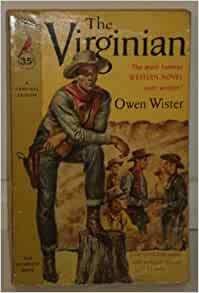 The Virginian
The VirginianOrigin: Public Domain
When I was in the 7th grade, I won a puppy—a long-haired border collie mix that I named Sam—at the school fair. I’m not sure who was more surprised, my father, or myself. I do know who was happier!
PS: I’d love to show you a picture of Sam, but all our photos of that time were destroyed by Hurricane Sandy.
Buy Link
Global Link
¸.•*´¨)✯ ¸.•*¨) ✮ ( ¸.•´✶
About the Author
Gifford MacShane is the author of historical fiction that celebrates the resilience of the human spirit.
Her novels feature a family of Irish immigrants who settle in the Arizona Territory in the late 1800s. With an accessible literary style, MacShane draws out her characters' hidden flaws and strengths as they grapple with both physical and emotional conflicts.
Singing almost before she could talk, MacShane has always loved folk music, whether it be Irish, Appalachian, spirituals, or the songs of the cowboys. Her love of the Old West goes back to childhood, when her father introduced her to the works of Zane Grey. Later she became interested in the Irish diaspora, having realized her ancestors must have lived through An Gorta Mor, the Great Irish Potato Famine of the mid-1800s. Writing allows her to combine her three great interests into a series of family stories, each including romance, traditional song lyrics, and a dash of Celtic mysticism. Having grown up in a large and often boisterous Irish-American family, she is intimately acquainted with the workings of such a clan and uses those experiences to good purpose (though no names will be named!)
MacShane is a member of the Historical Novel Society and is an #OwnVoices writer. A self-professed grammar nerd who still loves diagramming sentences, Giff currently lives in Pennsylvania with her husband Richard, the Pied Piper of stray cats.
Connect with Gifford MacShane
Website • Twitter • Goodreads • Amazon




